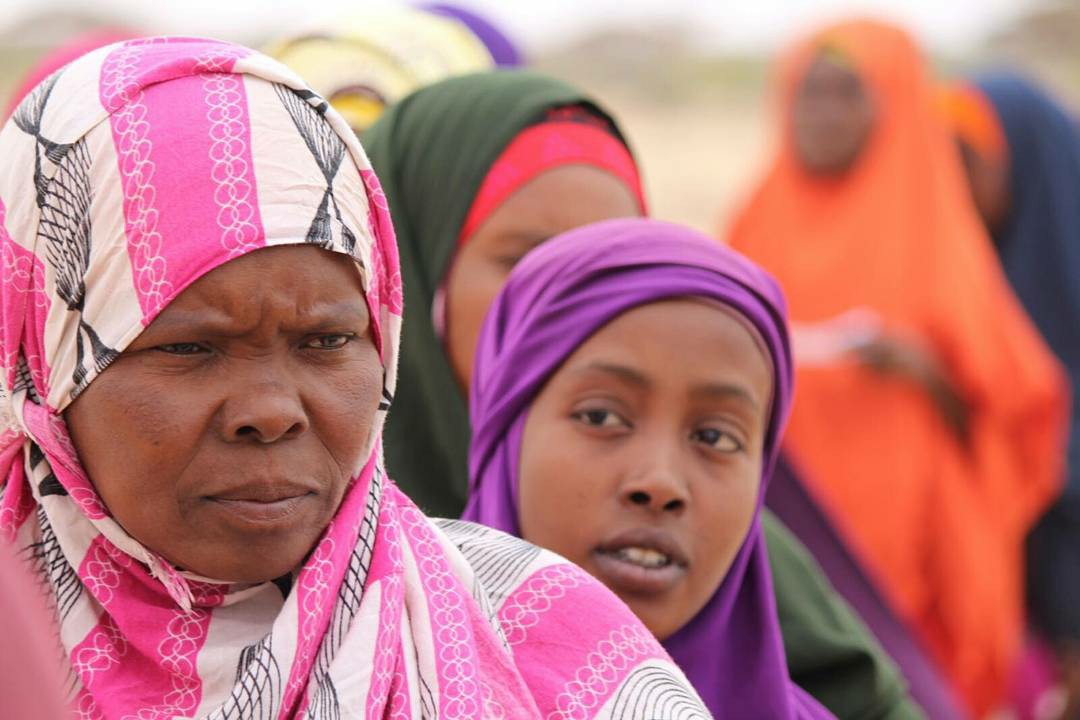
在索馬利亞的加爾卡尤市(Galkayo),一群流離失所的婦女在Salama IDP營區內的分配點上(旱災侵擾著Mudug地區) 。2017年9月10日。照片來源:Faaris Adam,已經同意後使用
在2018年4月7日這天,正當世界衛生組織(WHO)以世界衛生日慶祝其70週年慶之際,非洲國家就連最基礎的衛生醫療條件也無法改善,這讓他們時常面臨嚴峻的健康危機,即便如此,卻也難成為眾人關注的頭條新聞。
例如,東非的索馬利亞( Somalia)及西非的奈及利亞(Nigeria)等國家,人民基本的健康狀況依然糟糕,這與世界衛生組織的核心創立原則相矛盾:
The enjoyment of the highest attainable standard of health is one of the fundamental rights of every human being without distinction of race, religion, political belief, economic or social condition.
享有可達到的最高健康標準,是每個人的基本權利之一;這個準則不因種族、宗教、政治理念、經濟或社會條件而異。
索馬利亞人民的心理健康問題正惡化
特別是索馬利亞,因長期內戰所帶來的心理創傷,再加上長期缺乏治療精神疾病的公共衛生機構,讓心理健康成為當地的巨大問題。根據世界衛生組織報告,在索馬利亞,平均每三人中就有一人受精神疾病所苦,這也讓索馬利亞成為全球心理健康問題最嚴重的國家之一。
精神疾病患者還得面對極端的社會汙名,例如,刻意孤立、限制行動和監禁,因為社會大眾擔心他們可能傷害他人或自己。
住在Mudug農村地區的一位牧民Warsame就表示:
[a] 42-year-old took his sister to the clinic to find a treatment after being ill for years, Safiya had been ill for two years, and I decided to take her to the patient care center in Galkayo.
有個42歲的人在他的姊姊病了好幾年後,才帶她到診所尋求治療。Safiya才病了兩年,我就決定帶她到位在加爾卡尤市(Galkayo)的病人照顧中心。
在鄉村地區,提供治療精神疾病的機構很少,而且這些中心的醫療條件也不足,他們的規模通常小到無法給予足夠的藥物治療。
加爾卡尤心理健康中心(Galkayo Mental Health Central)是加爾卡尤市唯一能提供心理疾病照顧的機構,其精神科護理師 Ahmed Bali 解釋:
This center is public and is built by the community, and patients are all women and not charged for the services that we provide including accommodation and foods but the patients’ medicines are purchased.
這個中心是由社區建立的公共機構。這裡的病患全都是女性,我們提供住院和食物,並不收取服務費用;但病患的藥品需自費。
Bali 補充,在索馬利亞的文化中,罹患精神疾病的人被稱為「Ninka Waalan」(索馬利亞語中代表「瘋子」),小孩還會對著他們丟石頭並侮辱他們。
奈及利亞的危機:青年藥癮、醫師短缺
近來的一項報告指出,西非的奈及利亞面對兩個嚴重的健康危機:藥物濫用問題,及專業醫療人才外流到西方國家。
在奈及利亞,藥物依賴(drug dependence)的人數已大幅增加,這個現象在年輕人身上更明顯。奈及利亞學者 Umar Lawal Yusuf 和他的同事將藥物濫用(drug abuse)定義為:
a disorder that is characterized by a destructive pattern of using a substance that leads to significant problems or distress. Teens are increasingly engaging in prescription drug abuse, particularly narcotics (which are prescribed to relieve severe pain), and stimulant medications, which treat conditions like attention deficit disorder and narcolepsy. Drug abuse or drug dependence (as preferred by the world health organization), is defined as ‘a state of psychic or physical dependence, or both on a drug, following administration of the drug on a periodic or continuous basis.’
一種失調症候群,主因是以不正常的方式使用藥物而導致重大問題或痛苦。愈來愈多青少年陷入濫用處方藥的危機,特別是麻醉藥劑(用於緩解嚴重疼痛),以及用來治療注意力缺乏症候群和嗜睡症的興奮劑藥物。藥物濫用或藥物依賴(後者為世界衛生組織較常見的用詞)指的是「在定期或持續的藥物療程後,人們對藥物有著精神、身體或身心兼具的依賴狀態。」
研究顯示,藥物濫用有很多種不同的模式,但是在 Yusuf 的研究中最常見的是酒精(非法的琴酒或啤酒)、古柯鹼、尼古丁、苯環利定(phencyclidine,通常被稱為PCP)、鎮靜劑或焦慮藥物。
此外,有些奈及利亞的年輕人陷入濫用處方藥的危機:
Everyday, over a 500,000 bottles of codeine are consumed by young Nigerians across the country, same with the intake of , rohypnol, marijuana, and other opioids, an alarming trend that has subtly eaten deeply into the Nigerian fabric with children of all classes having a field day abusing these drugs. But parents, stakeholders and the society continue to live in self-denial as a time bomb waits to explode.
奈及利亞的年輕人每天共計服用超過500,000瓶可待因(codeine)、特拉嗎竇(tramadol)、羅眠樂(rohypnol)、大麻和其他鴉片類藥物,這是一個嚴重的警訊;這種藥物濫用的狀況甚至可能向下侵蝕、影響兒童。但是,父母、利益關係人和整個社會仍不願意面對這個事實,僅坐等著定時炸彈引爆。
最近一份報告顯示,「在奈及利亞北部的 Kano 州及 Jigawa 州,每天約消耗了超過300萬瓶的可待因糖漿。」
以下這部由 Tony Rapu 發布在臉書的影片也揭露一項事實:在奈及利亞的拉哥斯城(Lagos),有些男人會把海洛因注射到體內(警告:內有寫實影片)。年輕人甚至會「混合變性酒精(methylated spirit)和可口可樂,讓自己變得更亢奮。」
Mixing this spirit with coke might douse the bad taste but it doesn’t change the fact that in a bid to get high, young people are slowly doing irreparable damage to their own bodies. Drug abuse has now become a hydra-headed monster. As appealing as the idea of placing stringent rules on the sale of drugs may seem, it is too obvious that it does nothing to solve the problem.
雖然酒精和可樂混合後嚐起來的口感變差,但不可否認的是,年輕人為了變得亢奮,卻慢慢地在傷害自己的身體。藥物濫用正成為一隻令人頭疼的巨獸。雖然有人提出要嚴格管控藥物販售,但很明顯地,這個策略並無法解決問題。
God please what's happening to this generation? pic.twitter.com/rkrv6BeWN7
— Adekeye . E. Tosin (@cutekimani) February 2, 2018
老天爺啊,這個世代到底怎麼了?pic.twitter.com/rkrv6BeWN7
— Adekeye . E. Tosin (@cutekimani) 2018年2月2日
但是藥物濫用本身,並非問題的全貌——問題還包括:這裡的醫師少到無法給予治療。雖然奈及利亞醫學及牙醫學理事會(Medical and Dental Council of Nigeria)有註冊執業醫師的名冊,但是實際在奈及利亞執業的醫師人數仍成謎。
有些報告指出,「奈及利亞約有8萬名註冊執業的醫師和牙醫師,這也包含國外培訓人員」。然而,
out of these 80,000, there are some people who are dead, some have left the country, some no longer working as doctors and some have stopped renewing their practicing licences. Some of the older doctors have been given a ‘life time practicing certificate.’
在這8萬人之中,有些人早已逝世,有些人則已離開這個國家,有些人不再當醫師,有些人則未再更新他們的執業證照。有些更老的醫師則獲得「終身執業證書」。
更糟糕的是,奈及利亞流失了許多醫師,他們前往英國或美國尋求更好的工作機會。根據世界衛生組織提供的「醫師/病人比例」建議顯示出,2015年時,奈及利亞面臨嚴重的醫師短缺問題:
The World health Organisation (WHO) standard ratio is one doctor to a community of about 600 people while the nurses ratio stood at one nurse to four patients and one environmental officer to 8,000 people.
世界衛生組織的標準比例是:每600個人要有1名醫師;每4個病人要有1名護理師;每8000人,則要有一名環境健康專員。
奈及利亞醫學院(Association of Colleges of Medicine of Nigeria )教授 Folashade Ogunsola 估計:
We will need about 237,000 medical doctors and we have about 35,000 working in the country today.
在奈及利亞,我們需要約23.7萬名醫師,而目前我們僅有3.5萬名醫師。
西非民意調查機構 NOIPolls 及民間組織「奈及利亞健康觀察(Nigeria Health Watch)」共同做了一份名為「移居國外的奈及利亞醫師」的調查。他們共號召了 705 名待在國內外的奈及利亞醫師填寫問卷,並與 26 名醫師進行深度訪談。調查報告統計出以下幾個令人擔憂的主要發現:
A large proportion (83 percent) of doctors who filled the survey and are based abroad are licensed in Nigeria, indicating that they had completed their medical education in Nigeria before departing beyond the shores of Nigeria.
All respondents (100 percent) to the survey know medical doctors who presently reside in Nigeria, who are currently seeking work opportunities abroad. Furthermore, about one in two (48 percent) have between five to 15 friends and colleagues working in the medical profession who moved out of the country within the last two years.
Almost nine in 10 respondents (88 percent) disclosed they are seeking work opportunities abroad. Most respondents cited high taxes and deductions from salary (98 percent), low work satisfaction (92 percent), and poor salaries and emoluments (91 percent) as challenges doctors face that make them consider moving abroad.
The United Kingdom and the United States are the top destinations where Nigerian medical doctors seek work opportunities.
Improved remuneration (18 percent), upgrade all hospital facilities and equipment (16 percent), increase healthcare funding (13 percent), and improve working conditions of health workers were the top suggestions respondents proffered in mitigating the challenges doctors are facing.
多數填寫問卷的醫師(83%)在奈及利亞領取醫師執照但在國外執業,這代表他們在離開奈及利亞前,在這裡完成他們的醫學教育。
所有填寫問卷的醫師(100%)都表示,他們知道目前待在奈及利亞的醫師,都在尋找國外的工作機會。此外,每2位受訪者中即有1位(48%)表示,在近兩年內,他們有介於5到15位同業朋友或同事,已搬到國外。
10名受訪者中有9名(88%)透露,他們正在尋找國外的工作機會。多數受訪者提到,讓他們考慮出國工作的原因包含:低薪但高稅率(98%)、低工作滿意度(92%)、低薪低報酬(91%)。
英國和美國則是奈及利亞醫師尋求工作的首選地點。
若要緩解醫師正面臨的困境,受訪者給了幾點建議:改善薪資(18%)、更新醫院的設施和設備(16%)、增加健康照護經費(13%)、改善衛生人員的工作條件。
剛移民到英國的醫師 Akinola Olabisi,如此解釋為什麼他離開奈及利亞:
I considered the working conditions in Nigerian hospital where I initially worked as unsuitable. I had to cope with hectic working conditions made more difficult by the lack of basic hospital equipment, hostile working atmosphere, and measly salaries that were unpaid for several months. I was also not particularly motivated by the oppressive style of medical mentoring in many postgraduate training institutions. I do not intend to come back to settle in Nigeria. Poor remuneration tops the list of my reasons for leaving. The vast majority of Nigerian doctors earn so little compared to their counterparts in other African countries. It is shameful to hear what some doctors are paid, especially in the private hospitals. Also, hospitals are unacceptably short-staffed and the available hands are severely overworked. This undoubtedly takes its toll on productivity and quality of health care.
我認為一開始在奈及利亞醫院的工作條件很不適合我。我得應付相當忙亂的工作狀況,因為醫院缺乏基礎設備、工作環境也惡劣,醫院甚至積欠了幾個月的薪水。在這裡,許多學士後訓練機構的醫學訓練風格相當煩悶,我無法從中得到激勵。我並不打算回到奈及利亞定居,少得可憐的薪資就是我離開主因。相較於非洲其他國家的醫師,多數奈及利亞醫師領的薪水真的少得可憐。每當我聽到醫師領到這樣的薪水,真的覺得丟臉;特別是在私立醫院,低薪問題更嚴重。另外,醫院的人手短缺,也讓有限人力得做超量工作。這都讓我們的生產力及健康照護品質大打折扣。
不論是索馬利亞的精神疾病及污名化問題,或奈及利亞愈趨嚴重的青年藥物濫用問題,及醫師流向西方國家的荒災,都再再顯示,非洲國家人民的健康狀態仍然岌岌可危。






